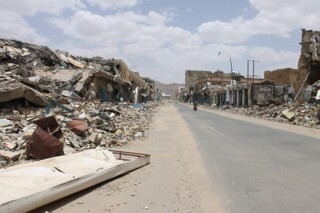In Sa‘dah
Maggie Michael
Abdullah al-Ibbi is a barber in the city of Sa‘dah, a Houthi stronghold in northern Yemen. He lost two wives, tensons, 17 daughters and daughters-in-law, and eight grandchildren, including a six-month-old baby, in a Saudi-led airstrike on 5 May. In the qat fields of al-Sabr valley, a few kilometres from Sa‘dah, at least 30 children were among the 53 civilians killed by warplanes on 3 June. ‘They say in the media they targeted a military camp,’ Hammoud Abdullah told me. Seven of his relatives, including four brothers, died in the attack. ‘But what happened is that they have killed our children.’
Since 26 March, a coalition of ten countries led by Saudi Arabia have conducted an extensive air campaign across Yemen, aimed at driving the Houthis from the capital, Sana‘a, and restoring the internationally recognised government. The campaign has so far managed to push the Houthis out of several southern cities, including Aden.
The scale of destruction in northern Yemen has revived decades-old hatred of Saudi Arabia. In 1934, shortly after the foundation of the Kingdom, the Saudis and Yemenis fought over the three oil-rich regions of Najran, Jizan and Asir. The Saudis won, but many Yemenis still don’t recognise the border. The Saudi-led campaign has also hardened support for the Houthis among people who might otherwise have turned against them for their misgovernment, use of unlawful detention, and silencing of the media and opposition voices. In Sa‘dah, the houses of opponents were blown up, and many leading Zaidi scholars fled the city for fear of Houthi reprisals.
Walking along a debris-covered road through the middle of Sa‘dah, I saw markets, schools, banks, petrol stations, administrative buildings and police stations that had been levelled. Inside the old city, encircled by a three-kilometre-long and four-metre-wide ancient wall, mud-brick houses have been turned to mounds of rubble. Residents gave me lists of the names of their neighbours who’d been pulled dead from the ruins. They said they were forced to live in funk holes to hide from the planes. Yahia Hatroom showed me where he, his wife, his mother and ten children take shelter from sunset to sunrise. Pulling back a plastic sheet, he uncovered the entrance to a tiny underground room. ‘We live in rabbit holes now,’ he said.

Comments
Yemen, one of the poorest countries in the world, and this guy has two wives, ten sons and 17 daughters and daughters-in-law.
The future is bleak in any such culture, violence or no.
Sorry.
© http://www.hrw.org/node/278426